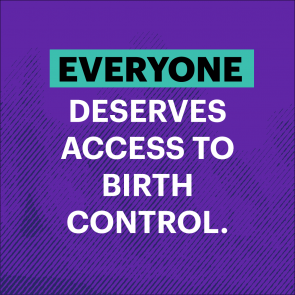Our Fight in the Supreme Court Includes Your Stories About Birth Control
 During a global pandemic, the Supreme Court will consider another attack by the Trump-Pence administration on reproductive health care, this time against the Affordable Care Act’s birth control benefit. Although the birth control benefit requires health plans to cover all FDA-approved methods of contraception for women with no out-of-pocket costs, the Trump-Pence administration issued rules that would allow basically any employer or university to opt-out of the requirement if they have a religious or moral objection to birth control. Thankfully, those rules never went into effect because numerous states sued and won in the lower courts. But the Trump-Pence administration has appealed their case all the way to the Supreme Court.
During a global pandemic, the Supreme Court will consider another attack by the Trump-Pence administration on reproductive health care, this time against the Affordable Care Act’s birth control benefit. Although the birth control benefit requires health plans to cover all FDA-approved methods of contraception for women with no out-of-pocket costs, the Trump-Pence administration issued rules that would allow basically any employer or university to opt-out of the requirement if they have a religious or moral objection to birth control. Thankfully, those rules never went into effect because numerous states sued and won in the lower courts. But the Trump-Pence administration has appealed their case all the way to the Supreme Court.
We’re weighing in with the Supreme Court through an amicus brief, which is a “friend of the court” brief, which we led alongside our partners the National Asian Pacific American Women’s Forum, the National Latina Institute for Reproductive Justice, SisterLove Inc., and law firm Lowenstein Sandler. The brief highlights personal stories about birth control that people just like you shared with us. We want to make sure the Court fully understands the devastating harm the rules would have on real people around the country, especially those facing multiple and intersecting forms of discrimination. Although we had to shorten these stories in our brief, we want to share more of these individuals’ words here.
In the brief, we show how birth control is critical to people’s health and equality. By allowing people to plan, space, and prevent pregnancy, birth control enables them to pursue academic and professional goals and achieve financial stability. We told the Court about Laurel, who pursued her dream of becoming an architect because she could create a solid financial foundation before having children, and about Loren, who because of birth control can focus on her studies and clinic practice as she pursues her Doctorate in Psychology.
Unfortunately, we know that cost determines whether people can get contraception. Without insurance coverage, like the ACA’s birth control benefit, the cost barrier can be too great. This is especially concerning at a time when millions of people are losing their jobs and families have less money on hand for necessities. A report found that during the last recession, some people stopped using contraception, skipped pills, delayed filling prescriptions, or purchased fewer packets at once.
Our stories backed this up. We told the Supreme Court about Ariel, a 19-year-old woman who needed contraception to manage heavy periods and debilitating cramps. Ariel lost insurance coverage and discovered her pill would cost $66 a month. At the time, Ariel was homeless. “$66 a month when I could barely [afford to] eat, wasn’t going to happen.” So Ariel was left to suffer through her symptoms.
We also shared Sofi’s story. When Sofi was 22, she got an IUD covered as a dependent on her mother’s insurance. But when her IUD became displaced, Sofi faced a $2,000 bill for replacement because her mother had lost her job and insurance. Forced to choose between paying rent or paying for a new IUD, Sofi went “without affordable birth control or insurance for almost seven months.”
Without access to birth control, people are at an increased risk of unintended pregnancy, which is already higher for women of color and young people. Access to contraception is likewise important to reducing the maternal mortality rate, which is at crisis levels in the U.S., especially for Black women, who are three to four times more likely to die from pregnancy-related causes than white women.
Losing birth control coverage also threatens the autonomy of survivors of intimate-partner violence. Over 1 in 3 women in the U.S. experience intimate-partner violence, and abusers frequently restrict access to money to gain control. Samantha was in an abusive relationship and had no control over her money to buy contraception. Just after turning 21, Samantha learned she was pregnant. “My abuser was not happy… I was threatened with many awful scenarios and put in many awful situations. I was able to escape but not without many emotional scars.”
Contraception is also critical for transgender men and gender non-conforming people, for whom pregnancy and menstruation can cause gender dysphoria. Zachary, a transgender man who uses birth control to prevent pregnancy, had been pregnant in the past and the stress caused him to miscarry. “Going through that was very difficult, as I had to deal with both gender dysphoria and the depression that comes from a miscarriage, especially when I couldn’t tell anyone. Hormonal birth control helps me take control over my body and prevent pregnancy.”
We shared these stories and more to show the Supreme Court just how harmful the Trump-Pence administration’s rules would be. NWLC and our partners will defend the ACA birth control benefit because everyone deserves access to birth control no matter where they work or go to school.




